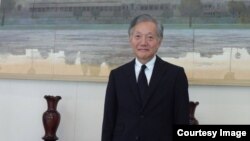[Editor’s note: After one year as Japan’s top diplomat in Cambodia, Ambassador Hidehisa Horinouchi oversaw Japan’s mission in democracy promotion in Cambodia through funding and technically supporting the National Election Committee amid a political period of upheaval. This week, VOA Khmer’s Aun Chhengpor interviewed Horinouchi by email, discussing Tokyo’s ties with Phnom Penh and Japan’s perception of the political developments in Cambodia.]
VOA: How does Japan view its relations and role in Cambodia since the signing of the 1991 Paris Peace Agreement?
Horinouchi: The relationship between Japan and Cambodia has been developing in various fields since 1991. Upon longtime friendship between these two countries, in 2013, Prime Minister Shinzo Abe and Prime Minister Hun Sen decided to upgrade the bilateral relations to a “strategic partnership” and also to coordinate and cooperate more closely on regional and international issues. Under this partnership, Japan and Cambodia have been strengthening the cooperation in many areas such as electoral reform, infrastructure building including roads, bridges, and ports, the removal of landmines and unexploded bombs, and encouraging of investment. We hope that the start of direct flights linking Japan and Cambodia last September and upcoming establishment of a consular office in Siem Reap in January will reinforce the economic relations and people-to-people exchanges between the two countries. Cambodia has been achieving significant economic growth in recent years and became a middle-income country last year. We are of the view that this progress is attributed to Cambodia’s effort to proceed with the development of the country in an open manner to the international community under the democratic regime.
VOA: Cambodia has recently grown closer to China. What are Japan’s views about Sino-Cambodian relations?
Horinouchi: We are not in a position to make any comments on the relationship between Cambodia and other countries. We hope that each assistance from every donor will contribute to the development of Cambodia. Japan’s official development assistance has covered a lot of development issues here in Cambodia including water supply, maternal and child health, education, transportation, agriculture, landmine clearance, improvement of investment environment, enhancement of quality in the legal system including electoral reform and human resource development in various sectors. Japan has contributed to strengthening the socio-economic foundation while making use of Japanese experience and technology through collaboration with various development actors. This is the distinctive feature of Japan’s cooperation. Cambodia has achieved steady economic growth at an annual rate of 7 percent on average and drastic poverty reduction over the past 20 years. We are proud that Japan has played a role in these achievements. On the other hand, Cambodia faces new challenges such as the intensification of urbanization problems in Phnom Penh and the disparity between urban and rural areas. Japan continues to implement development cooperation in line with the development policy of the Royal Government of Cambodia.
VOA: Regarding the recent political crackdown in Cambodia, including the outlawing of the main opposition Cambodia National Rescue Party, many have expressed their skepticism on the status of democracy and credibility of the next year elections. What is Japan’s perception of the current status of democracy in Cambodia?
Horinouchi: We are concerned that it has led to the dissolution of the opposition party which gained support from a number of Cambodian people in the previous election. We have been conveying our concerns to the Royal Government of Cambodia. After the arrest and detention of the leader of the opposition party in September, Iwao Horii, parliamentary vice-minister for foreign affairs of Japan, visited Cambodia in October. Vice Minister Horii expressed his concerns about the escalation of tension in the recent political situation of Cambodia and urged the settle the issue by the efforts of Cambodian people themselves. In the meeting with Prak Sokhonn, foreign minister, State Minister Nakane expressed concern over the dissolution of the opposition, which received support from many Cambodian citizens at the previous election, and urged the Government of Cambodia to assure that next year’s election will be conducted in a way that appropriately reflects the will of the people. It is important for all stakeholders, including the ruling and opposition parties, to make efforts to hold next year’s national election in a way that will reflect the will of Cambodian people. Japan will monitor the development of the situation closely with strong interest and will give necessary encouragement to the stakeholders.
VOA: Following the CNRP’s dissolution, development partners like the European Union and the United States decided to withdraw support for electoral reforms. As a donor to the electoral reform process, what are Japan’s motivations to keep supporting the National Election Committee?
Horinouchi: In the Commune Election held in June, Japan’s assistance for the improvement of the operation of voter registration and vote counting contributed to the enhancement of the credibility of the electoral process. It is of utmost importance to have next year’s national election reflect the will of Cambodian people. Japan will monitor the development of the situation closely with strong interest. We will keep a dialogue with Royal Government of Cambodia and will continue to provide electoral reform assistance. Japan, as one of the countries which have cooperated to the peace building and nation building of Cambodia, truly hopes that the Cambodian people themselves pave the best way for their own future and development.
Note: This interview has been edited for length and clarity.







